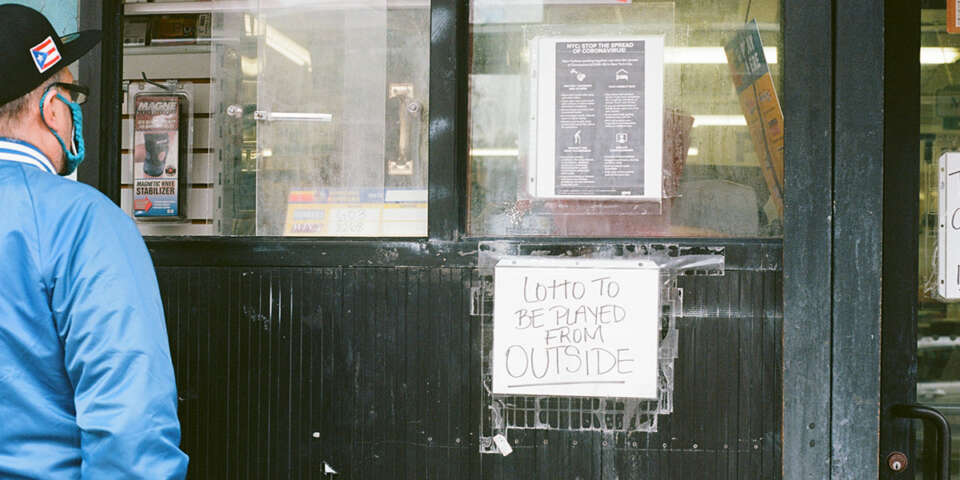Governments around the globe have adopted various emergency measures to manage the fallout of the pandemic. It is reasonable to assume that some of these measures will remain in place for the long term, if not permanently.
For the world lottery community, the key to success going forward will be continued global cooperation. Now, more than ever, the sharing of information among our members is paramount. We will do all that we can to disseminate best-practice information, including sharing the experiences our members have had in dealing with the pandemic crisis throughout the past weeks.
We recently interviewed 10 lottery CEOs from around the globe to get their perspectives on the current and lasting effects of the pandemic. Each of the questionnaire participants was posed the following ten questions:
- How has the pandemic and the resulting lockdown affected the lottery and sports betting sector?
- What do you believe will permanently change in the lottery and sports betting sector once the pandemic lockdown has been lifted?
- How has the pandemic lockdown affected the working environment of your operation? Do you foresee any permanent changes in how staff will work once the lockdown has been lifted?
- Has the lottery sector's fundamental mission of raising funds for good causes been affected by the lockdown?
- Lottery retail points of sale have been among those hardest-hit by the lockdown. Even operators with a well-established online presence rely heavily on retail channels to drive sales and acquire new customers. Do lottery leaders need to redefine how their retail points of sale operate?
- Pan-jurisdictional lottery games such as Powerball and EuroMillions, which were once viewed as robust gaming products, have also suffered as a result of the lockdown. What do lottery leaders around the world need to do to protect pan-jurisdictional games in the event of another lockdown?
- The cancellation of major sporting events has been devastating for the sports betting sector. Going forward, do you see sports betting operators embracing new products such as eSports or virtual sports to lessen their reliance on live events?
- Have illegal gaming operators been able to capitalize on the lockdown?
- What regulatory and contingency measures should be put in place in order to protect the lottery and sports betting sector as a whole in the event of a future crisis?
- How do you feel the WLA can best help its members in the event of a future lockdown?
Questionnaire answers on the effects of the COVID-19 pandemic lockdown on the lottery and sports betting sectors from the ten lottery CEOs who participated in the questionnaire:

Rebecca Paul Hargrove, President and CEO Tennessee Education Lottery Corporation, USA
How has the pandemic and the resulting lockdown affected the lottery and sports betting sector?
I think that answer is quite different depending on where in the world you live. Globally, we see that Spain, France and Italy have been impacted far differently than Australia and New Zealand. In the United States, we see that New York is impacted quite differently than Wyoming. The impacts of the virus have differed, and corresponding responses of city, state, and national governments have differed. We know that lottery sales in some U.S. states have increased while many decreased. And while the varying degrees of restrictions impacts sales, the relationship between the severity of the virus, the degree of safer-at-home initiatives, and the sales of lottery tickets is not nearly as consistent as you might think.
In our current circumstances, lotteries are performing better than games-of-chance sectors like casinos and sports betting, which have been shut down completely. But I would caution us to not make the leap from that happenstance to being overly confident in lotteries’ resilience in the face of economic downturn. We want our audiences – the public as well as lottery players and stakeholders – to know that we stand shoulder to shoulder with them because we are all in this together and that lotteries are not somehow immune to the pain of economic recession.
What do you believe will permanently change in the lottery and sports betting sector once the pandemic lockdown has been lifted?
Two behaviors that affect our industry and will clearly be impacted by the crisis are how we shop and how we gather together. Since the 1990s, purchasing has migrated online. Given the life-altering circumstances of the last three months, I would expect that market-share has increased as consumers minimize the time they spend in public spaces like grocery stores, bars, and restaurants. I’m sure that some people who never ordered online quickly learned how and began making more online purchases. Others, who were already online shoppers, probably increased the number and variety of items they buy online. The longer we are in safer-at-home mode, the more likely it is that activities adopted during this crisis will become habits that continue after the crisis abates.
What will the “new normal” look like? That will vary widely. Italy, Spain, together with New York and some other US states have been so severely impacted that the road to recovery will be arduous. Their “new normal” may be quite different than the pre-COVID environment. Social distancing, increased online purchasing and other lifestyle changes may be a bigger part of their new normal than in jurisdictions where the crisis was not so severe.
How has the pandemic lockdown affected the working environment of your operation? Do you foresee any permanent changes in how staff will work once the lockdown has been lifted?
The impetus to change and innovate is lowest when everything is going well. So, a crisis becomes the catalyst to take more aggressive action. We have to figure out how to streamline operations and workflows to adjust to leaner staffs and work-at-home environments. Sales reps may need to service their retailers without visiting the stores or with fewer in-store visits. And who knew that so much work could be done so well from home? One result of these crisis management adjustments is that the freedom – and the requirement – to innovate unlocks the creative energy that leads to new solutions and more efficient and effective ways to operate. Then, as we return to full-service operations, business processes can be adjusted and fine-tuned, and resources can be re-allocated to deliver a far higher level of quality and service to our retail partners. That leads to more funding for good causes and more value to all our stakeholders.
At the Tennessee Lottery, we have all found ways to be productive while working at home and staggering shifts so that we have a lower number of staff in the building at any one point in time. My team and I miss working together in person-to-person groups, and I suspect everyone feels the same way. We need social interaction, and I think the in-person collaboration contributes to the effectiveness of the enterprise. It is making those adjustments that can help any organization, but especially a lottery, survive during disruptive times.
If the cautious re-opening being pursued in my state of Tennessee goes according to plan, it is my hope we will return to the shopping and lifestyle behaviors of pre-pandemic days. Outside of that hope, I know all of us at the Tennessee Lottery focus on what we can do: making the necessary adjustments and innovations so we continue to fulfill our mission and raise money to support higher education for Tennessee students.
Has the lottery sector's fundamental mission of raising funds for good causes been affected by the lockdown?
I don’t see how it couldn’t be affected, but I think every market is different. Some may be significantly impacted by the pandemic while others may see only a minimal impact. There are multiple factors outside of our control that may affect our abilities to fulfill our missions.
Lottery retail points of sale have been among those hardest hit by the lockdown. Even operators with a well-established online presence rely heavily on retail channels to drive sales and acquire new customers. Do lottery leaders need to redefine how their retail points of sale operate?
We can be confident that brick-and-mortar retail is not going to sit idly as customers spend more online. Since their survival depends on an effective response to this competitive threat from the online marketplace, we can expect the rate of retail modernization, digitization, and innovation in general to increase. That’s a great opportunity for lotteries to carve out a role for itself as trusted partners and resourceful innovators who provide solutions and help them serve and retain their customers.
Pan-jurisdictional lottery games such as Powerball and EuroMillions, which were once viewed as robust gaming products, have also suffered as a result of the lockdown. What do lottery leaders around the world need to do to protect pan-jurisdictional games in the event of another lockdown?
A global pandemic is going to affect any game and its performance no matter what. The most powerful protection we can offer pan-jurisdictional games is really the most powerful protection we can offer any game: making the product and its brand the strongest they can possibly be for players. Any downturn is going to expose weaknesses, but as I mentioned earlier, it’s also a time for innovation and creativity.
However, we also have to be creative and innovative during good economic times. I think Powerball and EuroMillions serve as a reminder to all of us to look around corners during good and bad times and make the necessary adjustments.
The cancellation of major sporting events has been devastating for the sports betting sector. Going forward, do you see sports betting operators embracing new products such as eSports or virtual sports to lessen their reliance on live events?
I think this disruption has made everyone evaluate their products and look at potential new products. It will be interesting to see how the sector responds.
Have illegal gaming operators been able to capitalize on the lockdown?
Because of the lack of transparency and reporting, there’s no way to know for sure. However, we can assume that they’ve tried.
What regulatory and contingency measures should be put in place in order to protect the lottery and sports betting sector as a whole in the event of a future crisis?
I think you have to go back and look at the enabling legislation in each jurisdiction. The legislation may lay out a structure to give regulators and operators more flexibility to adapt to a changing economic environment. Some entities have to budget even detailed line items two years out and are not allowed to adjust when the whole world is sick. Others have an overly politicized management structure that changes too frequently. Multiple factors drive success and even more impede progress and positive action.
The enabling legislation that prescribes the terms and conditions under which a lottery or regulatory body operates can have a profound effect on the agency’s ability to pivot in times of crisis.
How do you feel the WLA can best help its members in the event of a future lockdown?
Our WLA and regional association conferences are sorely missed. Zoom or Microsoft Meetings or conference calls are incredibly helpful, but I still believe that working together in-person provides us with the most meaningful platform to share ideas, learn from each other and come up with the best solutions.
I think during a future lockdown the WLA’s primary role will be lifting up and sharing best practices from around the world. While certain tactics or practices may not translate exactly from one jurisdiction to another, exchanging ideas of what worked and what didn’t is always valuable, especially during times of crisis and afterward.

Richard Cheung, Executive Director, Customer and Marketing at Hong Kong Jockey Club Lotteries Limited
How has the pandemic and the resulting lockdown affected the lottery and sports betting sector?
The pandemic resulted in the suspension of betting shops which in turn led to our closure of lotto games, as over 65% of our tickets are sold via shops. The stoppage of global football games has also forced us to stop our football lottery.
Our focus has been to sustain racing in a closed-door setting. We have been one of the few globally who are successful. Since over 80% of our racing customers have an online betting account with us, we are able to sustain a very large part of racing income.
What do you believe will permanently change in the lottery and sports betting sector once the pandemic lockdown has been lifted?
We have always had a 7-step end-to-end digital wagering journey in development from account opening, to online fund transfer, mobile booking, preparing to bet, betting/enjoying, CRM and customer services. We believe that the digitalization of our wagering customer experience has accelerated customer adoption of all these steps. Before the crisis, our average online betting is 73% of turnover and I would expect the number to stay at 80% even after our shops reopen.
How has the pandemic lockdown affected the working environment of your operation? Do you foresee any permanent changes in how staff will work once the lockdown has been lifted?
The general feeling is that the world will be in a “new normal”. I can imagine many of the crowd control and social distancing measures will continue in our shops and racecourses. The whole operation will place more emphasis on the safety of employees and customers.
In our office, I imagine more of our colleagues will be deploying remote communication like Zoom.
Has the lottery sector's fundamental mission of raising funds for good causes been affected by the lockdown?
Even this is a short-term reduction in betting duty this year – I firmly believe that our mission of lottery for good cause will remain the same. In fact, during this COVID-19 outbreak, we have set up a HKD 100 m emergency fund as well as made various charity donations. One of the donations is giving out mobile internet data cards to 100,000 underprivileged students who may not have internet access at home and need data bandwidth for their remote learning.
Lottery retail points of sale have been among those hardest hit by the lockdown. Even operators with a well-established online presence rely heavily on retail channels to drive sales and acquire new customers. Do lottery leaders need to redefine how their retail points of sale operate?
I personally see online wagering share will go up after the crisis despite retail has their role. However, operators have to think hard about the value of retail point of sales on top of transactions. The directions would be more around education, responsible gambling and customer acquisition.
The cancellation of major sporting events has been devastating for the sports betting sector. Going forward, do you see sports betting operators embracing new products such as eSports or virtual sports to lessen their reliance on live events?
eSports or virtual sports is not on HKJC’s plan for now.
Have illegal gaming operators been able to capitalize on the lockdown?
The offerings by illegal gaming operators on Hong Kong races have been evidentially growing during the lockdown, when Hong Kong remains as one of the few jurisdictions that sustain racing.
How do you feel the WLA can best help its members in the event of a future lockdown?
WLA may encourage members to share their experience in tackling the lockdown and impact from the epidemic. Members may also mutually update the latest local measures for a better flow of information.

Stéphane Pallez, President and CEO of la Française des Jeux (FDJ), France
How has the pandemic and the resulting lockdown affected the lottery and sports betting sector?
While many economic sectors have slowed downed during the lockdown, there were some specific consequences on our lottery activity. First, we stopped our express draw game Amigo early in the lockdown, to avoid point of sale stationing, and as the crisis is evolving, the game is yet to resume. Second, the closure of some points of sale and the decline in customer traffic has led to a decline in sales for scratchcards and other draw games. Third, our online sales experienced extraordinary growth. In this context, we had to adapt our commercial plan, postponing several scratchcard launches, draw games events, and cancelling some promotional campaigns. We focused our efforts on our digital plan to increase subscriptions and retain these new customers.
The sports betting sector was more seriously affected, with up to 95% of competitions cancelled during the lockdown. Despite this very limited offer our teams did their best to make some of the few remaining active leagues available for our retail and online players to bet on. Our regulator also authorized bets on new sports and competitions. The future of sports betting will heavily rely on the recovery of the sports industry as a whole, and considering the impact that this crisis has had on many clubs and athletes, FDJ will more than ever continue its support program for promising professional athletes. There are reasons to be optimistic, as some professional leagues resume and since mid-May we have been able to offer bets on at least one match a day.
What do you believe will permanently change in the lottery and sports betting sector once the pandemic lockdown has been lifted?
At this time, we have to assess if and how consumption behaviors have changed and we are currently analyzing how the economic downturn will have a long-term impact on the market. We anticipate many changes, but with no guarantee on the real structural challenges, that is why we are talking about the “next normal” instead of “back to the past”.
On a mid-term vision, our main projects are to : think about the future of express draw games by digitizing the customer journey and challenging the mechanics of the offer, revising the scratchcard journey to modernize it and take into account the lessons from this period, and finally to build on the online sales growth momentum.
How has the pandemic lockdown affected the working environment of your operation? Do you foresee any permanent changes in how staff will work once the lockdown has been lifted?
Severe lockdown restrictions on transport and offices have affected many businesses. FDJ anticipated government measures by extending its remote working policy whenever this was possible. Fortunately, continuous investment in digital tools over the past years have made it possible for 95% of employees to work from home. Remote management of our operations was effective within days, and within weeks we could conduct electronic draws of our games Keno and Joker+.
Full remote working is not foreseen as a long-term dynamic but has proven to be an effective solution in period of crisis, with strong employee engagement delivering good results. Nevertheless, the experience of these new working methods will be beneficial, with the reduction of commuting having a positive impact on quality of life and the environment. Reconsidering the way we travel and work, our society will definitely be more digital than before.
Has the lottery sector's fundamental mission of raising funds for good causes been affected by the lockdown?
The lottery industry, particularly in times of crisis, is expected to uphold its solidarity commitments regardless of commercial performance. FDJ has naturally continued to support its main stakeholders affected by the pandemic. Masks were purchased for nursing homes run by veteran associations, our historical shareholders which initiated the national lottery 90 years ago. Protections were also distributed to retailers, and they received a financial boost with the suspension or scalability of financial levies on points of sale, depending on their capacity to stay open.
Given the sanitary and social emergency facing many communities, FDJ dedicated EUR 1 million to a nationwide initiative “United against the virus” to support health workers, research, but also those hardest hit by the crisis. The FDJ Corporate Foundation donated EUR 200,000 to the French “Secours Populaire” in a vast campaign to provide assistance to the most vulnerable. Employees also demonstrated their sense of solidarity, after an agreement with social partners paved the way for voluntary donations of leave days to help finance health and social actions. They donated over 1,400 leave days, which correspond to an amount of EUR 300,000, in favor of the medical staff and those in need.
In addition to these initiatives implemented as a response to the emergency situation, FDJ is mobilized to safely resume all its gaming activities which contribute to raise funds for the benefit of society. The next edition of our games in favor of the renovation of national heritage sites will be particularly important to raise some much needed funds for a sector which has been hardly hit by the lockdown.
Lottery retail points of sale have been among those hardest hit by the lockdown. Even operators with a well-established online presence rely heavily on retail channels to drive sales and acquire new customers. Do lottery leaders need to redefine how their retail points of sale operate?
Even if bars and restaurants were forced to close, many distributors who sell our games such as news agents and tobacconists were considered as essential economic sectors and allowed to pursue their activity. This highlights the relevance of our distribution network, the largest in France, as a proximity network. Distributors’ revenue was impacted by limited opening hours and the decline in foot traffic and consumption, and as customers are coming back to the stores, they are facing new challenges to enforce new hygiene and social distancing rules. As a long-standing partner, FDJ will continue to adapt its games and services to ensure a sustainable business in this particular location that is the point of sale, distributing games to a wide public with the highest level of safety for both the distributor and customers. Digital tools will become essential in the distributor’s relationship with customers, but also with the lottery sales force to enable a more interactive cooperation. Our instore digital screens and dedicated distributors’ website have been very helpful during this crisis to provide information to both our players and distributors.
Pan-jurisdictional lottery games such as Powerball and EuroMillions, which were once viewed as robust gaming products, have also suffered as a result of the lockdown. What do lottery leaders around the world need to do to protect pan-jurisdictional games in the event of another lockdown?
Looking at our experience with EuroMillions, we can say that pan-jurisdictional games were particularly challenged during the lockdown, as all participating countries were impacted by this pandemic, and it was impossible to predict the intensity and duration of the lockdown in a given territory. Nevertheless, the game was maintained without amending its prize structure and the draws were all carried-on without downgrading any integrity requirement. This illustrates the robustness of the game and a collective effort and engagement of all partner lotteries. It was also an opportunity to test and improve contingency procedures with the help of digital solutions. I am convinced that these learnings will reinforce our operations and cooperation in the future. Moreover, pan-jurisdictional games are important driver towards our digital platforms, and have contributed to the extraordinary rise in online stakes during the lockdown.
Have illegal gaming operators been able to capitalize on the lockdown?
Everyone has been able to note that all the online gambling sector have actually been taking advantage of the lockdown which took place to the detriment of the retail activities. The pandemic may in this respect entail important changes in the players’ habits and consumption patterns that will probably not spare the gambling sector, and of which we should all take stock. Those evolutions are still ongoing, and they can end up in opportunities for both the illegal and the legal online gambling operators. By the way, we are monitoring whether illegal operators have gained particular advantages during this period.
For these very reasons, it is crucial that the legal ones, and notably lotteries, are given the possibility and the conditions to develop their online offerings and to promote them in a responsible way, in accordance with their common values. This is the precondition for the achievement of the primary mission lotteries are entrusted with, which consists in channeling the demand for gambling towards a regulated and controlled offer.
On the other hand, it is of utmost importance, now more than ever given the particular context, that national authorities take efficient enforcement measures against illegal online gambling offerings, with the aim not only to protect consumers but also to ensure a level-playing field for lotteries. Lotteries should act in this respect and aim to raise awareness about the threats and the unfair competition arising from illegal operators, and I have no doubt the WLA taskforce can assist them in doing so.
What regulatory and contingency measures should be put in place in order to protect the lottery and sports betting sector as a whole in the event of a future crisis?
I would like to focus on the sports betting sector, as the suspension of many sports competitions has made it more important than ever to take the right measures to protect the integrity of both remaining sport events and of our betting activity. In this context, the Global Lottery Monitoring System (GLMS) enabled an international cooperation which has been very helpful for its members. GLMS knowledge and expertise can actually help us all to secure our betting activity and we must continue to support this very operational sport integrity association. It will be even more important when our activities will soon resume as Interpol is already sending warnings about the risks associated with sports organizations that were financially fragilized by the pandemic.
How do you feel the WLA can best help its members in the event of a future lockdown?
The WLA has an important role to play in such situations, where its members across all continents face simultaneous sanitary and economic challenges and can learn from each other’s experience. In this specific situation the WLA made a lot, sharing a dedicated Covid-19 newsletter, regularly taking care of its members and exceptionally reducing its membership fees by 50% as a gesture of solidarity. Moreover, the WLA acting as a forum for exchange is very appreciated and should continue even if physical meetings are not possible in a near future. As the global gambling market will continue to evolve, it is important that WLA members defend their values and vision of the industry. Compliance with the highest standards and adoption of best practices are essential to meet the expectations of modern customers looking for a safe and sustainable gaming environment. Finally, WLA support to the operational development and broadening of the membership base of GLMS will also be key to secure the sports betting operations of its members.

Yaping Feng, Director General of China Welfare Lottery Issuance and Management Centre
How has the pandemic and the resulting lockdown affected the lottery and sports betting sector?
The Covid-19 pandemic has greatly affected national lottery sales and operation in China. In order to prevent the spread of the virus, we suspended lottery sales and operation for 49 days, including 10-day shutdown during the Spring Festival holiday. Lottery drawings for national lotto and numbers games didn’t resume until March 11th. And our VLT halls have reopened since May 11th.
There are several aspects of the impact. Firstly, our lottery retailers are under more pressure. They lost two-month commission due to 49-day shutdown. Secondly, with the not-yet-lifted ban on internet lottery and the closed lottery shops, players couldn’t continue to play lottery games. We therefore have seen a big decline in our sales, public welfare fund and issuing fees. From January to April 2020, national welfare lottery sales reached 29.978 billion yuan, down 54.1% year-on-year.
What do you believe will permanently change in the lottery and sports betting sector once the pandemic lockdown has been lifted?
Globally, the pandemic is not yet under control or is not going to disappear soon. In Chinese mainland, as we resume production and work, we will adhere to regular prevention and control measures against the coronavirus in our work and daily lives. The pandemic will probably reshape people’s consumer behavior and social behavior, including the consumer behavior of lottery players.
How has the pandemic lockdown affected the working environment of your operation? Do you foresee any permanent changes in how staff will work once the lockdown has been lifted?
When the pandemic peaked in China, we adopted the working arrangements that combined flexible working schedules, working online and working from home. We took various measures, such as disinfecting our offices every day, requiring everyone to keep social distance, wear a mask and conduct body temperature check when entering the office, encouraging video conferencing, and enjoying separately-packed meals in one’s own office.
With work and production resumption, we have returned to normal operations; meanwhile, we still adhere to the prevention & control measures against the virus, including wearing a mask in the office area and social distancing. All provincial welfare lottery centers implemented similar measures. Now employees are embracing more video conferencing, paying more attention to personal hygiene, wearing mask and washing hands often. These changes have no big impact on our work.
Has the lottery sector's fundamental mission of raising funds for good causes been affected by the lockdown?
No. Our fundamental mission has not been affected at all by the lockdown. On the contrary, the role that lottery sector plays in raising funds for good causes is becoming more important and prominent. We believe that more lottery fund may be allocated to public health and disease prevention and control.
Lottery retail points of sale have been among those hardest hit by the lockdown. Even operators with a well-established online presence rely heavily on retail channels to drive sales and acquire new customers. Do lottery leaders need to redefine how their retail points of sale operate?
The covid-19 pandemic has affected our business greatly. However, we believe that retail points of sales will remain an important channel for lotteries over a period of time, under the influence of multiples factors like development history, playing behavior, policies and employment.
Retailers are vital to our business. Lottery regulator, operator and sales organizations did everything we could in different ways to help them mitigate the economic effect of the pandemic and to stabilize the retail channel. The Ministry of Finance, the regulator, allocated a total of 200 million yuan of special funding to support lottery retailers across the country to fight against the pandemic. As a lottery operator, we decided to increase the commission for our retailers from January through April 2020 (January through June in Hubei province) based on the type of games sold. The money comes from the operating fees of each type of games. For instant tickets, we cut the operating fees from 2% to 1% and the 1% goes to the retailer commission. For lotto, numbers, Keno and VLTs, during the four months, all operating fees go to retailer commission. Provincial welfare lotteries also implemented similar measures and allocated special funds to provide local retailers with one-time subsidies or supplies like masks, hand sanitizers, disinfectants etc.
In the long term, while tapping the potential of the existing sales channels, we will explore different types of channels and seek cross-industry cooperation.
Pan-jurisdictional lottery games such as Powerball and EuroMillions, which were once viewed as robust gaming products, have also suffered as a result of the lockdown. What do lottery leaders around the world need to do to protect pan-jurisdictional games in the event of another lockdown?
We have Union Lotto, quite similar to Powerball and EuroMillions. In the event of another lockdown, on the one hand, we need to improve our capacity of providing online training and services. We offered disease prevention and control guidance and online training via an online service platform towards points of sales nationwide. On the other hand, we suggest adding online betting or betting via phones.
The cancellation of major sporting events has been devastating for the sports betting sector. Going forward, do you see sports betting operators embracing new products such as eSports or virtual sports to lessen their reliance on live events?
At the moment, we don’t offer any sports betting products.
Have illegal gaming operators been able to capitalize on the lockdown?
Yes. Illegal gaming, especially illegal online gaming, may increase taking advantage of the pandemic. We suggest that relevant government agencies collaborate in cracking down on illegal gaming.
What regulatory and contingency measures should be put in place in order to protect the lottery and sports betting sector as a whole in the event of a future crisis?
In the Chinese mainland, the ban on internet lottery is not yet lifted. However, we think it’s important to explore the Internet business model to improve sales capacity. For instant tickets, players may order tickets online and have them delivered home. For lotto and numbers games, players may bet via phones or online platforms, and have their slips typed from offline channels. Efforts could also be made in facilitating the approval of new games, accelerating the launching process into the market, establishing online training system and improving service.
How do you feel the WLA can best help its members in the event of a future lockdown?
We think WLA could first summarize the experience, measures and information regarding pandemic prevention and control, lottery sales resumption, and how to encourage players to purchase again etc. Then WLA could strengthen sharing and enlarge exchanges through e-conference or network database or other means to help the lottery community guard against risks.

Nigel Railton, CEO of Camelot UK Lotteries Limited
How has the pandemic and the resulting lockdown affected the lottery and sports betting sector?
Like many businesses, we have seen some impact on National Lottery retail sales – in-store sales typically make up around 70% of total UK National Lottery sales – as a result of the ongoing retail disruption caused by COVID-19. It's too early to say what the overall effect will be on National Lottery sales over the medium to longer term, but what is clear right now is that there has definitely been a change in the way people are playing The National Lottery during this period. We've seen a significant increase in downloads of the National Lottery app and traffic to our online channels.
We’ve introduced a raft of measures to support our employees, players and retailers during this period. As part of these, and in line with government guidance, we've been supporting retailers and players by actively encouraging players to only buy tickets in retail if they're already in-store doing an essential shop – and to play online instead. We've adapted all of our current advertising where we're promoting an upcoming draw or jackpot to include ‘Play online or via the app’ messaging. We're also reminding people who have winning retail tickets that they have 180 days from the date of the draw (around six months) to claim a prize, so to keep their tickets safe and not to make a special trip out to claim a National Lottery prize.
What do you believe will permanently change in the lottery and sports betting sector once the pandemic lockdown has been lifted?
While nothing is certain at the moment, we have seen more people playing online during this period. It remains to be seen whether some of the players who traditionally played in retail will continue to play online – or whether they will return to their old habits when the pandemic is over. Needless to say, we’ll continue to do everything we can to support our 44,000 retail partners – as they are the backbone of The National Lottery here in the UK.
How has the pandemic lockdown affected the working environment of your operation? Do you foresee any permanent changes in how staff will work once the lockdown has been lifted?
In line with the current Government guidance – which says that people are still able to travel to work where this absolutely cannot be done from home – our sites are accessible to a small number of business-critical employees who need to be at work to carry out their duties. For example, we still need a limited number of people to run the National Lottery draws six nights a week and we have some colleagues in our Distribution Centre packing and sending out deliveries to retailers.
The vast majority of colleagues are working from home and those who are required to be on site are following social distancing recommendations and other guidance (staggered breaks, regular hand-washing, etc). In addition, when their on-site duties are completed, they are free to return home – so are on the premises for as little time as possible.
It’s too early to say how working will change in the medium to longer term, but the fact that the vast majority of our employees have been successfully working from home since March – paired with the fact that we have already implemented a range of on-site measures to ensure our business-critical employees are protected – means that we are in a good position.
Has the lottery sector's fundamental mission of raising funds for good causes been affected by the lockdown?
The current situation has emphasized the importance of the work The National Lottery does in raising over GBP 30 million every week for Good Causes around the UK. That’s because National Lottery distributors continue to fund vital work in communities (including meal delivery services for the elderly, food banks and projects that help overcome loneliness and isolation) and these funds will become even more essential in the coming months.
In total, up to GBP 600 million of National Lottery funding is being directed towards UK charities and organizations to help tackle the impact of COVID-19. For example, the National Lottery Community Fund recently announced that up to GBP 300 million will be used to support the most vulnerable in communities across the UK as part of this wider package.
Lottery retail points of sale have been among those hardest hit by the lockdown. Even operators with a well-established online presence rely heavily on retail channels to drive sales and acquire new customers. Do lottery leaders need to redefine how their retail points of sale operate?
Thanks to our continued innovation and investment in The National Lottery’s digital channels, we’ve been able to meet the requirements of greater numbers of players playing online – whether that be on their smartphone or tablet via the National Lottery app, or their desktop on the recently refreshed National Lottery website.
We’ve also been looking closely at any adjustment, no matter how great or small, we can make to accommodate players moving from retail to playing online. For instance, with so many new online account registrations, we made it easier for these players – some of whom will have traditionally only played in retail – by implementing a number of measures, including lowering our minimum online deposit limit from GBP 10 to GBP 5. This has ensured that people who just want to buy a ticket or two play online instead of going out to a shop unnecessarily to do so.
Our retail partners have been under a lot of pressure in the current situation, so we’ve been doing everything we can to support them – namely actively encouraging players to only buy tickets in retail if they're already in-store doing an essential shop and waiving any fees if they have had to close their store as a result of COVID-19. And we’ll continue to do everything we can to support them in the future too.
Pan-jurisdictional lottery games such as Powerball and EuroMillions, which were once viewed as robust gaming products, have also suffered as a result of the lockdown. What do lottery leaders around the world need to do to protect pan-jurisdictional games in the event of another lockdown?
In light of the various measures to combat coronavirus that were introduced in some of the nine countries in which EuroMillions operates and the potential impact that these could have on the operation of the game, we temporarily changed how advance play worked on both EuroMillions and its spin-off game EuroMillions HotPicks.
Previously, players could buy tickets for EuroMillions and EuroMillions HotPicks for four weeks in advance (eight draws). However, in March, before the UK officially announced its lockdown, we implemented a four-week countdown for advance play on these games. This meant that each week the amount of weeks that could be played in advance went down by one week, until players were only able to play for one week in advance (two draws). Players were still be able to buy tickets on a draw-by-draw basis and the draws themselves still took place as planned.
This limited advance play option stayed in place for a number of weeks while we, and the other EuroMillions operators, continued to closely monitor developments. Fortunately, we are now in a position where we’ve been able to return the game back to four-week advance play. However, we believe that this temporary change was in players’ best interests given the uncertainty caused by the unprecedented and fast-changing situation that was unfolding across the EuroMillions community.
What regulatory and contingency measures should be put in place in order to protect the lottery and sports betting sector as a whole in the event of a future crisis?
The implications of the global pandemic, and ensuing lockdowns, have thrown up many new challenges for businesses – and that hasn’t been any different for Camelot. We’ve had to move quickly and adapt to an ever-changing situation, while continuing to meet our licence and integrity obligations. Of course, we already had extensive contingency measures in place, by way of our Business Continuity Plan. However, we had to adapt our plan to the actual situation and to bring it in line with the Government guidance being issued.
Throughout this period, we’ve implemented a range of measures – for example, our Contact Centre can now work from home, we’ve updated our advertising to encourage people to play online, we’ve lowered our minimum online deposit limit from GBP 10 to GBP 5, etc – which have enabled us to continue running The National Lottery as safely and responsibly as we can. This is because we know the importance of the work it does in raising GBP 30 million every week for Good Causes around the UK.
How do you feel the WLA can best help its members in the event of a future lockdown?
We appreciate the WLA continuing to provide ongoing updates about how other operators are responding to the crisis.

Lynne Roiter, President and CEO of Loto-Québec, Canada
How has the pandemic and the resulting lockdown affected the lottery and sports betting sector?
Concerning sports betting, it has forced us to adapt our betting offer by adding new leagues and new sports. Since the return of some European football leagues we see our sales increasing. At the worst moment of the situation we were reporting less than 5% of our projections. We are now around 30% of our projections. It is not going to come back to normal until North American sports come back.
A key factor was to be able to maintain the discussion with our players on social networks so even if many of them were not betting, they kept in mind our brand It was a great adaptation.
As for the lottery, in Quebec retail stores were closed for six weeks (22 March until 4 May). During that period, we shifted our focus to online sales. Since 81% of population plays lottery games in Quebec, and that the jackpot was at its highest level during stores closing, not everyone had a chance to register. But we did increase substantially the number of online registration, active players and online lottery sales.
What do you believe will permanently change in the lottery and sports betting sector once the pandemic lockdown has been lifted?
First, the situation may have convinced online reluctant players to convert to this channel.
Second, sports betting operators will make sure not to rely only on a few sports and may expend their offer.
And third, the omnichannel experience will become essential. By connecting the virtual and the brick-and-mortar environment, we will be helping the retailers with online tools for instance (ex. online ticket checker).
How has the pandemic lockdown affected the working environment of your operation? Do you foresee any permanent changes in how staff will work once the lockdown has been lifted?
The closure of our establishments for several weeks now has had an obvious effect on our operations. We have already implemented new ways of doing and working. Of course, Loto‑Québec will continue to follow the recommendations dictated by Quebec’s Government. To date, it is legitimate to believe that Loto-Québec will have no choice but to continue to encourage teleworking as much as possible, as well as to sensitize people to the respect of the sanitary measures conveyed by adapting its establishments accordingly. Furthermore, rotational work should certainly be expected in the event that a gradual return to the establishments is implemented.
Has the lottery sector's fundamental mission of raising funds for good causes been affected by the lockdown?
The lockdown has not changed the fact that we continue to remit 100% of our revenues to the government. Loto-Québec maintained 100% of its commitments towards sponsorships to support festivals and gatherings that have been canceled, as well as to support scholarships for sports athletes. In addition, it is important to note that since the lockdown, Loto-Québec donated $1 million to the food bank Moisson Québec, which was distributed equitably among its 19 organizations. Also, the kitchens of the Casino de Montréal and the Casino du Lac‑Leamy have been reactivated to produce, each week, more than 50,000 meals to support the most vulnerable people during the pandemic. Loto-Québec also donated various types of products to the Ministère de la Santé et des Services sociaux, including more than 30,000 N95 masks.
Lottery retail points of sale have been among those hardest hit by the lockdown. Even operators with a well-established online presence rely heavily on retail channels to drive sales and acquire new customers. Do lottery leaders need to redefine how their retail points of sale operate?
The shopping experience has changed a lot. Retailers are promoting security and hygiene measures. Plexiglas is now installed everywhere near the cashier, so the lottery products are harder to see. Retailers are also reluctant to manipulate money to pay cash prizes or to verify the lottery tickets. We definitely need to monitor the changes and adapt to this new reality.
Pan-jurisdictional lottery games such as Powerball and EuroMillions, which were once viewed as robust gaming products, have also suffered as a result of the lockdown. What do lottery leaders around the world need to do to protect pan-jurisdictional games in the event of another lockdown?
This is a difficult question to answer. These games are based on a high volume of sales to be profitable. Being too conservative on the prize structure would make the games less appealing and we cannot hold funds in case a situation like this happen again.
The key is a close monitoring of the games. Some small adjustments to the games’ features and structure can be made, but if the sales are close to the break even, an interruption of the game could be considered.
The cancellation of major sporting events has been devastating for the sports betting sector. Going forward, do you see sports betting operators embracing new products such as eSports or virtual sports to lessen their reliance on live events?
Yes. Operators need to think about how to survive in such situation. Esports and virtual sports are among the options to look at if it was not already part of their offer. The ability to quickly add new competitions, new sports, and novelties if possible is also part of it. Most important, it all has to be done keeping in mind the importance of sports integrity and risk management. But whatever addition an operator makes, it won’t compensate for the lack of major live sports events.
Have illegal gaming operators been able to capitalize on the lockdown?
We observed that illegal online gaming operators have intensify their advertising and communications. On the other hand, unlike Loto-Québec, we also noticed that some of them seemed to have disabled phone customer service support due to the crisis to focus only on chat and e-mail. As indicated above, Loto-Québec saw online gaming on lotoquebec.com increase significantly, presumably as a reason of the retailer’s shutdown. We expect future market study to further understand the impact of the lockdown.
What regulatory and contingency measures should be put in place in order to protect the lottery and sports betting sector as a whole in the event of a future crisis?
For sports betting, we don’t see regulatory measures or contingencies, other than those mentioned in my previous answers, to be put in place for a future crisis.
For the lottery, online gaming and betting and the omnichannel experience should be developed as much as possible.
How do you feel the WLA can best help its members in the event of a future lockdown?
In light of all the information received by its members, it could certainly be helpful for WLA to provide them with the best practices which emerged from this study, in particular, which could give support to its members in the event another situation like this one would arise in the future.

Gordon Medenica, Director of the Maryland Lottery and Gaming Control Agency, USA
How has the pandemic and the resulting lockdown affected the lottery and sports betting sector?
The pandemic has had a predictable impact on sales, which declined by as much as 30% in the first few weeks of Maryland’s stay-at-home directive. We’re beginning to see an uptick in sales in recent days, particularly in our daily number games. With an incremental easing of restrictions over time, and people eager for entertainment options, we are cautiously optimistic that sales will continue to recover.
What do you believe will permanently change in the lottery and sports betting sector once the pandemic lockdown has been lifted?
The lockdown spurred many questions from our players about online sales. The Maryland General Assembly passed a law in 2017 that specifically prohibits us from selling online, but it’s possible that the loss of revenue during the pandemic will reduce the political resistance from both lawmakers and our retailers, many of whom still believe, against all evidence, that on-line lottery sales would hurt traditional brick-and-mortar businesses. The average consumer expects to be able to access everything online, especially during times like these when stay-at-home directives have made it difficult for our players to purchase lottery games.
How has the pandemic lockdown affected the working environment of your operation? Do you foresee any permanent changes in how staff will work once the lockdown has been lifted?
Maryland Lottery Headquarters have been closed since March 30, in accordance with a state-of-emergency directive from our governor. Since that time, the MLGCA has had to adapt to a new way of doing business, with the majority of our employees teleworking. Sales reps stay in touch with their retailers via phone, email and online webinars. Teleconferencing, virtual meetings and other distance-communications tools have been used with much success. While there have been many adjustments during this new normal, critical work has continued without interruption. Moving forward, we may find that aspects of our work can be done just as efficiently, if not more so, through teleworking and other alternative work styles.
Has the lottery sector's fundamental mission of raising funds for good causes been affected by the lockdown?
Of course we’ve been affected by the lockdown, but our commitment to responsibly generate revenue for Maryland’s good causes remains unchanged. That said, we did suspend all of our advertising beginning in mid-March and continuing through the end of May. It would have appeared “tone-deaf” to be advertising our products and promotions during a public health crisis. In its place, we created messaging to encourage safe play. The messaging was displayed on in-store video monitors to encourage social distancing and safety. We also published a list of steps that players could take to reduce the duration and frequency of their lottery transactions. These include advance-play options; filling out playslips in advance; using the quick-pick option instead of taking the time to select specific numbers; and subscriptions that can be purchased from home.
Lottery retail points of sale have been among those hardest hit by the lockdown. Even operators with a well-established online presence rely heavily on retail channels to drive sales and acquire new customers. Do lottery leaders need to redefine how their retail points of sale operate?
The pandemic may have accelerated the trend away from retail for certain products, but brick-and-mortar retailers will survive this crisis and continue to play a critical role in lottery sales. Even if lotteries are allowed to sell more broadly through online as well, retail will remain dominant for the foreseeable future.
Pan-jurisdictional lottery games such as Powerball and EuroMillions, which were once viewed as robust gaming products, have also suffered as a result of the lockdown. What do lottery leaders around the world need to do to protect pan-jurisdictional games in the event of another lockdown?
The slowdown in sales that we have seen with Mega Millions and Powerball began well before the pandemic. As an industry, we have been grappling with the long-term impact of jackpot fatigue for years. An important aspect of jackpot fatigue may well be media fatigue, as the games receive much less free media coverage at lower jackpot levels than before. We are learning the importance of marketing and advertising to the continued success of the games. Nevertheless, we know the games attract infrequent players who seem to need ever-higher jackpots to excite people to play. And while we are experiencing softness in sales right now, the next huge jackpot is sure to bring players back.
The cancellation of major sporting events has been devastating for the sports betting sector. Going forward, do you see sports betting operators embracing new products such as eSports or virtual sports to lessen their reliance on live events?
Not at all; when real sports return, so will the sports-betting sector. In fact, if future live events have fewer in-stadium spectators, broadcast and streaming coverage will become more important than ever. And with so much of sports betting taking place via mobile devices, watching and betting on sports will thrive. As for smaller, even fringe sports (drone racing?), they will take some market share of betting activity in line with their interest level among fans.
Have illegal gaming operators been able to capitalize on the lockdown?
I doubt very much that the illegal operators have had any better experience during the pandemic. There is simply no product to bet on, whether legally or illegally.
What regulatory and contingency measures should be put in place in order to protect the lottery and sports betting sector as a whole in the event of a future crisis?
Depending on the nature of future crises, the industry has learned much during the current pandemic on how to react to constraints on sales channels and product distribution. Also, casinos, when they reopen, will have much different operating protocols that will continue for some time. But sports betting is fundamentally linked to the underlying sports, and will rise and fall along with sporting activity.
How do you feel the WLA can best help its members in the event of a future lockdown?
The WLA has done an excellent job in re-aligning its activities in response to the pandemic. Its fundamental mission of informing and communicating critical insights and best practices for its membership remains highly relevant.

Younes El Mechrafi, General Director La Marocaine des Jeux et des Sports (MDJS), Morocco
How has the pandemic and the resulting lockdown affected the lottery and sports betting sector?
Out of responsibility and as a part of its contribution to the national system to control the spread of COVID-19, MDJS chose to suspend all its gaming activities during the lockdown.
Two main reasons explain this situation:
First, since most of sales are concentrated in the points of sales, MDJS wanted to strictly respect contingency measures and not create health risks for customers;
Second, fixed odds betting is the main product of MDJS. Due to the lack of high-level football competitions during the health emergency period, we preferred not to offer risky bets (limited number of bets available every day creating more risk for payout, higher match-fixing risks – regarding secondary championships, and therefore money laundering risks).
What do you believe will permanently change in the lottery and sports betting sector once the pandemic lockdown has been lifted?
It is difficult to assess the future in the current situation owing to the many uncertainties. The duration of the crisis, and the fears of customers are the main factors able to emphasize the situation. Nevertheless, the following factors have to be taken in account: an increased business volume made through digital channels; the potential loss of some gaming habits; lower available income after a huge economic crisis; and better anticipation and preparation in the event of an occurrence of another pandemic in the near future.
How has the pandemic lockdown affected the working environment of your operation? Do you foresee any permanent changes in how staff will work once the lockdown has been lifted?
Teleworking has been adopted by all the employees. Operations have been fully suspended during the lockdown, but it would have been difficult anyway – for instance traffic between cities during the lockdown is strictly controlled, making the dispatch of the programs nationwide very difficult. Challenges are yet to come after the resumption date with a socio-economic environment that may present difficulties for recovering from the crisis.
Has the lottery sector's fundamental mission of raising funds for good causes been affected by the lockdown?
Sales will be strongly affected by the COVID-19 crisis. They might be lower than 30% of what was budgeted. This means that money for sports – MDJS finances Moroccan sports – might be affected in the same way. Nevertheless, MDJS is currently putting together an action plan with changes able to rectify the situation and limit the losses for Moroccan sports.
Also, MDJS mobilized and allocated DHS 100 million to the Special Fund for the management of the COVID-19 pandemic. This fund has been set up to support the costs of upgrading medical devices, support the national economy in coping with the shock induced by the pandemic, and preserving jobs and limiting the social impact.
Lottery retail points of sale have been among those hardest hit by the lockdown. Even operators with a well-established online presence rely heavily on retail channels to drive sales and acquire new customers. Do lottery leaders need to redefine how their retail points of sale operate?
The COVID-19 crisis happened in a period where there is a need to redefine the links between the points of sale and the digital networks. MDJS is currently planning several options in this way (e.g. a mobile app).
A physical network must be involved in the digital transformation of lotteries; the aim being to create as many bridges as possible between the physical and the digital channels. Traditional points of sale should be able to remain digitally active in the event of an another lockdown.
Pan-jurisdictional lottery games such as Powerball and EuroMillions, which were once viewed as robust gaming products, have also suffered as a result of the lockdown. What do lottery leaders around the world need to do to protect pan-jurisdictional games in the event of another lockdown?
The success of pan-jurisdictional lottery games success is based on high volumes and the highest possible number of players. In such a crisis, there are less players and therefore less “natural” jackpots. To make sure that customers are not disappointed about the level of jackpots, it is necessary to plan for similar situations in the future (possibly with an important reserve fund).
The cancellation of major sporting events has been devastating for the sports betting sector. Going forward, do you see sports betting operators embracing new products such as eSports or virtual sports to lessen their reliance on live events?
Of course, virtual games can compensate losses generated by classical sports betting games, but virtual sports games are games of chance and fixed odds betting or sports pools games are games of expertise. Moreover, virtual games are less exciting than sports betting and might create higher addiction risks.
ESports betting can also be a very good solution as eSports has a large fanbase and is getting more and more popular over the years, but then with a close monitoring on match-fixing issues, especially if the eSport tournament is online and not an event that takes place in a dedicated space.
Have illegal gaming operators been able to capitalize on the lockdown?
Pure players (100% online) have been able to capitalize on the lockdown. Illegal gaming operators have been in a much better situation than other operators. They offer a higher payout and don’t have to be challenged with retail costs. Their competitive edge has been three times increased: More winnings, no taxes, and no retail issues.
What regulatory and contingency measures should be put in place in order to protect the lottery and sports betting sector as a whole in the event of a future crisis?
It is almost impossible to protect the responsible business of a lottery in such a crisis. But these measures maybe can help: the promotion of online betting; monitoring of the offer (avoiding offering betting on risky events – money laundering and match fixing); monitoring the strict application of measures in terms of responsible gaming; detection and alerts on anti-competitive practices.
How do you feel the WLA can best help its members in the event of a future lockdown?
The WLA could help by providing some benchmarks about lotteries like the status of each member (full lockdown for the physical network or not, online sports book with the available tournaments open for sports betting) and WLA could also send a report / update on the cancellations and resumptions of championships and tournaments (for sports betting).
A practical handbook about best practices (after the crisis) might also be very helpful for the future.

Dato Lawrence Lim Swee Lin, CEO of Magnum Corporation Sdn Bhd, Malaysia
How has the pandemic and the resulting lockdown affected the lottery and sports betting sector?
Magnum has been in complete lockdown since March 18, 2020 over a series of six phases, which will only end on June 9. We are unsure if the lockdown will be further extended thereafter. From March 18 to June 9, we would have had to cancel 37 draws with zero revenue from lottery sales for the Company and our retailers during that period.
What do you believe will permanently change in the lottery and sports betting sector once the pandemic lockdown has been lifted?
Basically the consumers’ lifestyle would have changed with many now being more family oriented and home centric in their activities. Their buying habits, including for physical lotteries, would have been altered although we will need until the lockdown is lifted to see if the changes are permanent and the extent of the change.
How has the pandemic lockdown affected the working environment of your operation? Do you foresee any permanent changes in how staff will work once the lockdown has been lifted?
It has certainly accelerated the Work From Home (“WFH”) trend. It has given positive proof that it is possible to incorporate WFH, though perhaps not wholly or completely, as part of a more flexible work culture going forward.
Has the lottery sector's fundamental mission of raising funds for good causes been affected by the lockdown?
The regulators have been more focused on combating COVID-19 and saving lives than addressing the fund raising issue. That, I believe, will take on greater prominence once the extent of the damage to public finances due to the pandemic is recognized.
Lottery retail points of sale have been among those hardest hit by the lockdown. Even operators with a well-established online presence rely heavily on retail channels to drive sales and acquire new customers. Do lottery leaders need to redefine how their retail points of sale operate?
Social distancing and tracking measures will have very adverse implications on the operations of our retail channels. It will be especially challenging for stand-alone, lotteries only outlets whose viability may be called into question if physical volumes decline significantly and permanently.
Pan-jurisdictional lottery games such as Powerball and EuroMillions, which were once viewed as robust gaming products, have also suffered as a result of the lockdown. What do lottery leaders around the world need to do to protect pan-jurisdictional games in the event of another lockdown?
If, as expected, the average spend per lottery customer falls: the jurisdiction will need to expand to cover a larger potential customer base; a merger of a number of such pan- jurisdictional game may need to be seriously considered; and a drastic redesign of the game and/or prize structure to reduce the headline top Jackpot amount while expanding the number of smaller subsidiary prizes to increase the total number of winners and bring back excitement to the game by increasing the winning experience.
The cancellation of major sporting events has been devastating for the sports betting sector. Going forward, do you see sports betting operators embracing new products such as eSports or virtual sports to lessen their reliance on live events?
ESports will gain further traction. Physical games may have to be played in front of an empty stadium with simultaneous broadcast and streaming the preferred way to entertain and engage with fans.
Have illegal gaming operators been able to capitalize on the lockdown?
Being unregulated, illegals are not limited to the same extent in their operations during lockdown. They have also been able to innovate using new technologies in the new normal including following draw results of other legalized lotteries when their “home” lottery is not permitted to operate.
What regulatory and contingency measures should be put in place in order to protect the lottery and sports betting sector as a whole in the event of a future crisis?
To permit and encourage contactless transactions at outlets; and more customer friendly online purchases for lotteries and sports betting.
How do you feel the WLA can best help its members in the event of a future lockdown?
To create a section on the WLA website to post best practices and lessons learnt (including unintended horror stories) from around the world during the COVID-19 pandemic.

Jesús Huerta, President and CEO of Sociedad Estatal Loterías y Apuestas del Estado (SELAE), Spain
How has the pandemic and the resulting lockdown affected the lottery and sports betting sector?
Regarding the effect that this crisis has had on sports betting, I must point out that SELAE does not currently market counterpart sports betting. The only sports betting product sold by SELAE is La Quiniela, a pari-mutuel betting product.
Regarding the consequences that confinement on the products that SELAE commercializes in general, the immediate consequence has been the closure of its physical and online Points of Sale from March 15 to May 18 with the consequent loss of revenues during this time.
What do you believe will permanently change in the lottery and sports betting sector once the pandemic lockdown has been lifted?
I think it is too early to reach conclusions. It will be necessary to wait to get out of this situation completely to be able to analyze what happened and the incidents in the development of the business and therefore to obtain the consequences that arise and the resulting measures that would have to be implemented, if necessary
How has the pandemic lockdown affected the working environment of your operation? Do you foresee any permanent changes in how staff will work once the lockdown has been lifted?
During the alarm state, health has been the fundamental objective and to which all the activities of SELAE have been subordinated. However, remote working was prioritized over on-site work except in those operations where it was essential the physical presence of the workers.
Thanks to the effort of all the workers and their adaptation to the special circumstances, we managed to maintain vital operations and to be able to restart our draws and daily activities on May 18 at the beginning of the de-escalation period.
Has the lottery sector’s fundamental mission of raising funds for good causes been affected by the lockdown?
Not especially. SELAE, in normal conditions, already contributes with a considerable economic contribution, according to a percentage of the annual income set by law, also with different organizations and NGOs of social, cultural, and sports character.
During this crisis we have focused more on directing our aid to the health field, providing, for example, a large amount of health material and covering the basic needs of many families, helping to alleviate the negative effects of this lock-down.
Lottery retail points of sale have been among those hardest hit by the lockdown. Even operators with a well-established online presence rely heavily on retail channels to drive sales and acquire new customers. Do lottery leaders need to redefine how their retail points of sale operate?
The products SELAE markets are products that are highly based on tradition and on the physical contact between seller and buyer. Therefore, the physical Points of Sale continues to be the main commercial agent of SELAE.
For this reason, SELAE’s commercial policy is aimed, above all, at trying to retain those weekly buyers, such as those at La Quiniela, so that they may also participate in the rest of SELAE portfolio, such as traditional Lotteries and Lottos and promote others, such as horse racing, supporting a wider divulgation through the media to increase their popularity.
Pan-jurisdictional lottery games such as Powerball and EuroMillions, which were once viewed as robust gaming products, have also suffered as a result of the lockdown. What do lottery leaders around the world need to do to protect pan-jurisdictional games in the event of another lockdown?
During this crisis, Euromillions has demonstrated its robustness and implantation in the countries participating in this game, resisting the situation posed by letting some of these countries participate in these draws, causing a reduction in revenues and jackpots. Even at that point, the game remained competitive and little by little it is recovering its place in the market at the levels prior to lockdown.
The cancellation of major sporting events has been devastating for the sports betting sector. Going forward, do you see sports betting operators embracing new products such as eSports or virtual sports to lessen their reliance on live events?
As I said earlier, sports betting is not part of the SELAE portfolio except for our La Quiniela, which has little to do with sports betting.
La Quiniela is based on a tradition of many years that has passed from parents to children and football supporters. Both groups are the ones that maintain this product based more on entertainment and tradition than on its profitability.
Have illegal gaming operators been able to capitalize on the lockdown?
At SELAE we do not have outstanding references to illegal operators that directly affect our products.
What regulatory and contingency measures should be put in place in order to protect the lottery and sports betting sector as a whole in the event of a future crisis?
We are currently putting all our effort into the process of emerging from the current crisis and therefore need to complete this process in order to have time to study the consequences and possible measures to adopt in the event of a possible new crisis. There will be time for that.
How do you feel the WLA can best help its members in the event of a future lockdown?
Once this crisis is over, the WLA should analyze – through the different working groups and with the collaboration of all its members – the incidents that this crisis has caused in the different areas of the gaming business.
Once conclusions are reached, disseminate those measures that are applicable to a crisis such as the one we are currently suffering.
Each respondent’s answers can be accessed by clicking on their name above.
The inquiry had five main objectives:
- To evaluate what measures have proven successful;
- What measures were taken to protect lottery employees;
- What lotteries have done to support their communities;
- What can be learned from this crisis to better prepare the lottery in the future; and
- To evaluate what further the WLA can do to help support the world lottery community through this crisis.
By way of this inquiry, we hope to not only mitigate the impact that the COVID-19 pandemic has had on the lottery sector, but also to turn this crisis into a valuable learning experience for all our members.
Key takeaways from the questionnaire
Accelerating trend towards online
The COVID-19 pandemic has accelerated the trend toward online gaming that has been slowly taking hold in the lottery sector for the past 15 years. Lotteries that already had robust online gaming platforms in place prior to the outbreak of the pandemic were able to better mitigate the effects of the lockdown. For lotteries in countries where online gaming is prohibited by law, it is hoped that, given lessons learned over the course of the lockdown, regulators will be ready to re-examine the laws governing online gaming.
During the lockdown, retail Points of Sale (POS) were completely shut down in some countries. In jurisdictions where POSs were able to stay open, retail revenues were impacted by social distancing measures, limited opening hours, and a decline in foot traffic.
Although a move to strengthening online channels was expressed by questionnaire participants as desirable, it was agreed by most participants that the relationship lotteries have with their retailers is vital and should be protected. A move toward digital solutions that include and enhance the retail experience is preferred; however, online solutions should be able to stand alone in the event of a lockdown.
Sports vs eSports
Esports and virtual sports could partially compensate sports betting operators for losses should a new pandemic lockdown cause the cancelation of major sporting events. As such, they should be seriously considered as viable alternatives to betting on live sporting events. However, eSports and virtual sports cannot replace the excitement of live sporting events and potentially bring with them a high risk for addiction. Moreover, eSports and virtual sports are games of chance, whereas sports betting games (whether fixed odds or pools) are games of skill.
Community service
Encouragingly, the questionnaire also revealed that lotteries endeavored to support their beneficiaries despite lockdown-imposed austerity. In some cases, participant lotteries additionally donated revenue to help fight the coronavirus and to help protect the most vulnerable during the crisis. Lottery staff also provided valuable community outreach services, as in the case of FDJ employees who donated over 1,400 leave days – the equivalent of EUR 300,000 – in support of medical staff and persons of need afflicted by the crisis.
Likewise, the Hong Kong Jockey Club (HKJC) set up an HKD 100 million emergency fund during the COVID-19 pandemic and donated 100,000 mobile Internet data cards to underprivileged students who may not have Internet access at home.
La Marocaine des Jeux et des Sports (MDJS) also allocated MAD 100 million to a special fund established to support the costs of upgrading medical devices and to help support the national economy weather the impact of the crisis.
And in the UK, the National Lottery directed around GBP 600 million toward charities and organizations to help mitigate the alleviate the impact of the pandemic.
Safety first
All of the lotteries questioned followed strict measures to protect both their players and staff. In many cases, retail Points of Sale (POS) were closed. In those POSs that were allowed to remain open, social distancing and other hygienic safety measures were implemented and practiced to protect players and retail staff from possible infection. Prize claim centers were either closed completely, or remained open with restricted access. Lottery staff worked from at home wherever possible. Home office helped to mitigate disruption of services and ensure business continuity.
Sharing best practices
Questionnaire participants almost unanimously expressed their appreciation for the WLA for providing information and support throughout the pandemic crisis. They called on the WLA to further strengthen their role as a forum for knowledge sharing, disseminating best practices and lessons learned from countries around the world in order to better withstand a future lockdown.








